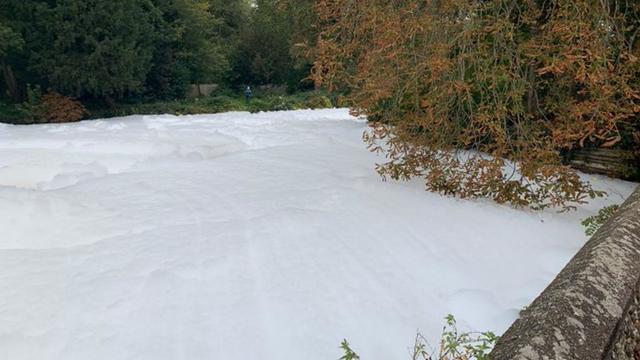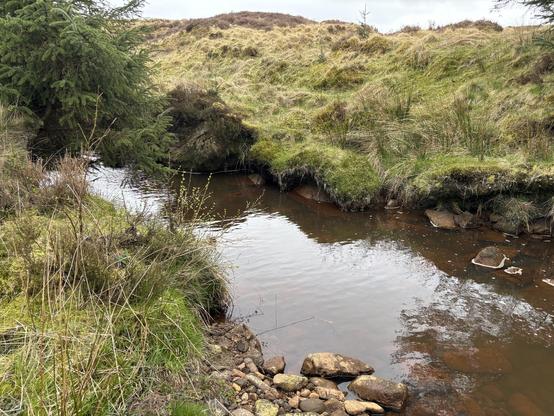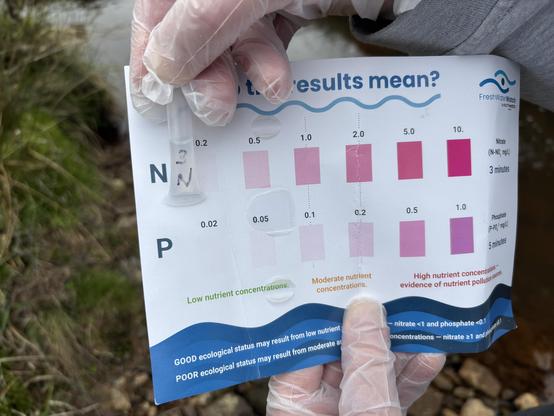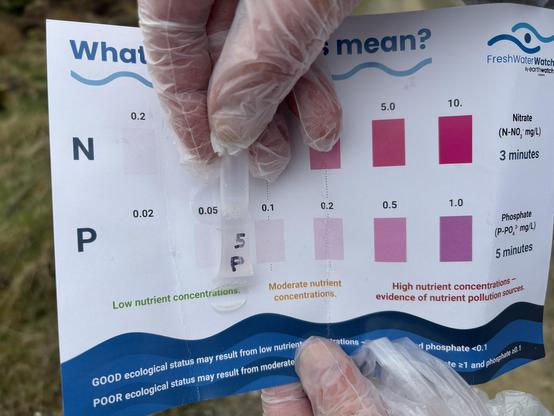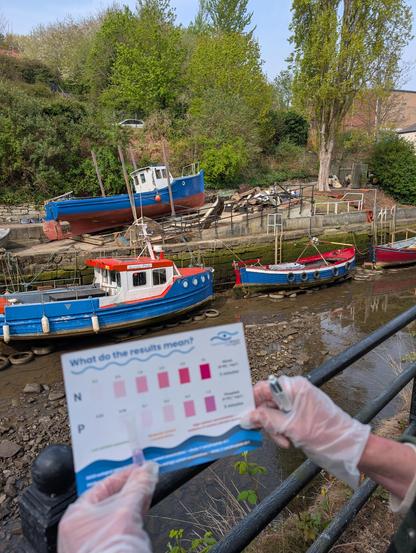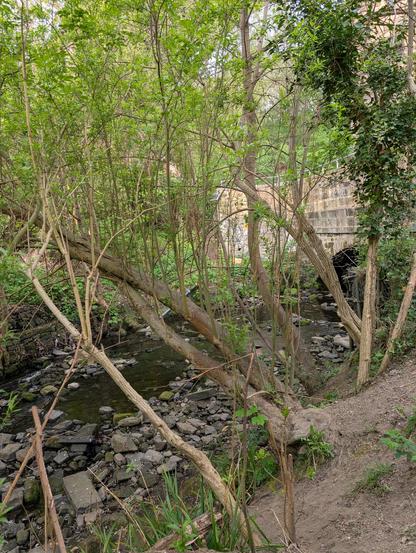A special team has been deployed at Sabarimala after the High Court intervened over clothing dumping in the Pampa river, with 95 staff now on duty. https://english.mathrubhumi.com/news/kerala/sabarimala-stop-cloth-dumping-pampa-river-p4bvnct0?utm_source=dlvr.it&utm_medium=mastodon #Sabarimala #RiverPollution #PampaRiver #Kerala #HighCourt
#RiverPollution
The pollution court case that could reach far beyond the banks of the River Wye
#Environment #ClimateChange #RiverWye #Pollution #Litigation #WaterCrisis #ClimateJustice #EnvironmentalLaw #CleanRivers #Sustainability #EcoJustice #RiverPollution #The14
https://the-14.com/the-pollution-court-case-that-could-reach-far-beyond-the-banks-of-the-river-wye/
Investigation underway after foam appears on River Thet in Thetford
A large volume of foam was spotted covering part of the River Thet in Thetford, prompting an investigation by the Environment Agency. The source of the foam has been identified and discharge stopped, but officials are still working to determine what caused the pollution. Fisheries officers are at th... [More info]
Thousands Sue Over Pollution in UK Rivers, Seeking Compensation and Clean-Up
A massive environmental lawsuit has been filed in the UK, involving nearly 4,000 claimants who are suing major poultry producers and a water company over extensive pollution in three rivers: the Wye, Lugg, and Usk. The plaintiffs allege that chicken manure runoff and sewage spills have severely affe... [More info]
Cảnh sát bắt giữ 3 đối tượng hút bể phốt và xả trực tiếp 50m³ chất thải xuống sông Tô Lịch. Hành vi gây ô nhiễm nghiêm trọng môi trường và nguồn nước. #MôiTrường #Environment #ÔNhiễmSông #RiverPollution #PhápLuật #Law
https://vtcnews.vn/bat-giu-3-ke-hut-be-phot-xa-chat-thai-truc-tiep-xuong-song-to-lich-ar967124.html
So, when I first saw this headline, I thought it was about the #UnitedStates making #EPA staffing cuts. Nope! It's the #UK! And this has been going on for a while now!
Thousands of #RiverPollution tests cancelled because of staff shortages
by Jonah Fisher, July 24, 2025
Excerpt: "Staffing problems are nothing new at the EA. In 2023 its chairman Alan Lovell told parliament that it had 'struggled with recruitment and retention of staff'.
"Internal emails obtained by campaign groups #Greenpeace and #Desmog through freedom of information requests were shared with the BBC. They show EA officials discussing the impact of staff departures on testing and saying that others planned to leave.
"One senior official, writing an email to her colleagues, said it was 'not good news I'm afraid' adding 'this isn't where we want to be (again)'.
"Helen Nightingale, who worked at the #EnvironmentAgency as a catchment planner, analysing data from its water quality programme until 2022, says that while she was there she saw a shift of focus away from serious investigation to trying to find 'successes'.
"She also said that morale was low: "The pay is not great – we didn't have pay rises for years due to #austerity.
" 'But a lot people are in it [the EA] because they want to make a difference – and when you're not even getting that - well, what's the point?'
"Documents seen by the BBC show that the work affected by the cuts to testing this year included investigations into the water industry in various parts of the country, and monitoring of #ProtectedAreas including the #RiverWye, which is currently facing a #pollution crisis linked to intensive #ChickenFarming."
Read more:
https://www.bbc.com/news/articles/cx24xy8zgp4o
Archived version:
https://archive.ph/o15LD
#WaterIsLife #UKNews #WaterPollution #WaterMonitoring #FactoryFarming #Drought #WaterLevels #Sewage
New recycling scheme targets farm plastic pollution in Welsh river catchments
A trial scheme to tackle plastic pollution from farms is being launched across south Wales, with the aim of improving river health and protecting endangered wildlife.
Led by Natural Resources Wales (NRW) through its Four Rivers for LIFE programme, the initiative will see new drop-off centres set up across four ecologically sensitive river catchments — the Teifi, Tywi, Cleddau and Usk — where waste such as silage wrap and feed bags has become a growing concern.
The scheme, delivered in partnership with Agricultural Plastics Environment (APE), Birch Farm Plastics, and Afonydd Cymru, aims to recycle an additional 200 tonnes of farm plastics over the next year. Farmers will be able to dispose of eligible materials at reduced cost, with centres opening at livestock markets in Talsarn, Crymych, Llandovery, Sennybridge, Raglan, and potentially Carmarthen.
“Healthy rivers support more than just wildlife — they help farming communities thrive,” said Chris Thomas, senior land management officer for Four Rivers for LIFE.
What farmers can recycle — and what they can’t
The scheme accepts a range of commonly used agricultural plastics, including silage bale wrap (in all colours), pit cover sheeting, fertiliser and feed bags, and feed buckets. These items can be dropped off without additional sorting.
However, some materials — such as bale twine, bale net wrap and string — require careful separation to be eligible for recycling. If not properly sorted, these items may be rejected at the drop-off centres, so farmers are being urged to prepare their waste accordingly.
River health and wildlife at risk
Plastic waste from farms can persist for years in river systems, entangling fish, birds and mammals, and blocking migration routes. All four rivers are designated Special Areas of Conservation (SACs) due to their rare ecosystems, including salmon, lamprey, and otters.
A 2023 WRAP report found the UK’s agri-plastic recycling rate sits between 20–30%, far behind countries like France (80%), Germany (65%), and Ireland (90%).
The new trial is backed by funding from the EU LIFE Programme, Welsh Government, and Welsh Water, and builds on previous success in west Wales.
Related rural and environmental stories from Swansea Bay News
Welsh Government launches £33m transition support for farmers at Royal Welsh Show
Published July 2025: Deputy First Minister unveils Sustainable Farming Scheme tools and funding, while Welsh Conservatives raise concerns over clarity and impact.
Carmarthenshire dairy farmers cleared of £360,000 fine after Home Office raid
Published June 2025: Farming family successfully appeals penalty after immigration enforcement action, raising questions about due process and sector pressures.
Welsh Water under pressure as sewage pollution incidents hit ten-year high
Published May 2025: Environmental groups and opposition parties call for accountability as sewage discharges surge across Welsh rivers and coastal areas.
#Carmarthen #Crymych #Farming #Llandovery #NaturalResourcesWales #PlasticRecycling #Recycling #RiverCleddau #riverPollution #RiverTeifi #RiverTywi
Welsh Water under pressure as sewage pollution incidents hit ten-year high
Natural Resources Wales (NRW) has stepped up regulatory action against Dŵr Cymru Welsh Water, warning the company must make urgent and fundamental changes to its operations after recording its highest number of sewage pollution incidents in a decade.
New figures published today show Welsh Water was responsible for 155 pollution incidents in 2024, including 132 linked to sewerage assets—a sharp rise from 89 in 2022 and 107 in 2023. The data reveals a 42% increase in sewage-related incidents over the past ten years, with the majority traced to foul sewers (423 incidents), storm overflows (168), and water treatment works (166).
“We’ve seen a huge deterioration in performance since 2020,” said Nadia De Longhi, Head of Regulation and Permitting at NRW. “Despite repeated warnings and interventions, Welsh Water has been unable to reverse this concerning trend.”
Storm overflow data shows widespread failures
Alongside the pollution incident report, NRW also published its 2024 storm overflow spill data, revealing 112,589 spills lasting a combined 929,168 hours across Wales. While slightly down from 2023’s record-breaking 121,422 spills, the figures still reflect widespread operational failures.
Analysis by Afonydd Cymru found that the top 20 most frequently spilling assets operated within legal limits—defined as rainfall exceeding 4mm per hour—for just 1% of the time. In total, 276 assets spilled for more than 1,000 hours, far exceeding thresholds that could be considered compliant under exceptional rainfall conditions.
The worst-affected catchments included the Ogmore, Loughor, and Clydach, with many spills linked not to sewer blockages but to failures at wastewater treatment works, including inadequate storm tank capacity and failure to fully treat incoming sewage.
Natural Resources Wales vehicle“Our priority is to prevent environmental damage before it happens,” said De Longhi. “We will be clamping down on unpermitted storm overflows and introducing tighter criteria for annual reporting.”
(Image: NRW)
Enforcement and investment
NRW has already pursued multiple prosecutions against Welsh Water, including cases linked to pollution on the Gwent Levels and a tributary of the Afon Llwyd. Officials say enforcement is not the preferred route, but necessary when preventative measures fail.
The regulator has secured record levels of environmental investment through the 2025–2030 Ofwat price review, and introduced new guidance on storm overflow permits to tighten compliance.
In 2025, NRW will launch a dedicated team to increase monitoring of discharges, carry out compliance checks and audits, and implement Pollution Incident Reduction Plans with annual improvement targets. A new framework for performance assessments—developed jointly with the Environment Agency—will come into force in January 2026.
“We will be clamping down on unpermitted storm overflows and introducing tighter criteria for annual reporting,” said De Longhi. “Our priority is to prevent environmental damage before it happens.”
The latest figures follow a landmark case earlier this year in which Dŵr Cymru Welsh Water was fined £1.35 million for more than 800 breaches of its sewage discharge permits across Wales and Herefordshire. The offences, which took place in 2020 and 2021, were linked to failures in self-monitoring and data reporting—issues that NRW said were avoidable and indicative of deeper systemic problems. The regulator has since downgraded Welsh Water’s environmental performance rating to two stars, citing a continued decline in compliance and transparency.
Meanwhile, public frustration is mounting. Residents in Gower have staged protests at wastewater treatment sites, demanding action over repeated spills near popular beaches like Brandy Cove and Caswell. Campaigners say the discharges are harming water quality, threatening tourism, and putting public health at risk. Welsh Water has pledged £2.5 billion in environmental investment between 2025 and 2030, but critics argue that rising water bills—set to increase by 42% by 2030—should come with greater accountability and faster infrastructure upgrades.
A Dŵr Cymru Welsh Water spokesperson said:
“We acknowledge the concerns raised in the report and accept that while the number of serious pollution incidents has slightly reduced, our performance is not where it needs to be. The industry across the UK has seen increases in pollution incidents.
“We are rightly being held to a higher standard and have improved our processes to meet this challenge, with better monitoring leading to detecting more short-lived event and better reporting.
“We are accelerating investment in key areas to reduce pollution incidents with a £4bn investment programme that includes £2.5bn on environmental projects.
“While we have made progress, such as increasing the number of incidents we find and self-reporting, we know more needs to be done.
“We remain committed to working constructively with NRW to deliver improvements and will be engaging closely on their new requirements and guidance, including the development of Pollution Incident Reduction Plans and further use of smart technology to spot problems in the sewer network before they can cause a pollution.”
NRW’s full Environmental Performance Report for Welsh Water, including updated star ratings, will be published this autumn.
Related stories from Swansea Bay News
Welsh Water fined £1.35m for over 800 breaches to sewage discharge permits
Published March 2024: Water company handed record fine after admitting widespread permit breaches across Wales.
Bumper water bills set for Welsh Water customers
Published April 2024: Customers face steep bill increases as company seeks to fund environmental upgrades and infrastructure repairs.
Campaigners in Wales join national protest against plastic pollution ahead of global treaty talks
Published May 2024: Environmental groups call for stronger protections for rivers and coastlines, including action on sewage and microplastics.
Residents say they’re ‘pooped off’ with Gower sewage spills
Published June 2024: Locals raise concerns over repeated discharges near popular beaches, calling for tougher enforcement and transparency.
#DwrCymru #pollution #RiverClydach #RiverLoughor #RiverOgmore #riverPollution #sewage #wastewaterTreatment #WelshWater
Another sample for Earthwatch FreshWater Watch / Great UK Water Blitz. Sample location Black Burn (in Tarset Northumberland), which flows into Tarset Burn and then River North Tyne.
#waterquality #watertesting #riverpollution #citizenscience #freshwaterwatch #GreatUKWaterBlitz #tarset #northumberland
Out this morning with Ouseburn Trust in the Lower Ouseburn Valley, taking river water samples and chemically analysing them, as part of Earthwatch FreshWater Watch / Great UK Water Blitz
#waterquality #watertesting #riverpollution #citizenscience #freshwaterwatch #GreatUKWaterBlitz #ouseburn #newcastle
🚨 RIOS CONVERTIDOS EN BASUREROS LOS PAÍSES QUE MÁS PLÁSTICO ARROJAN A LOS OCÉANOS 🥤
Un estudio publicado en Science Advances revela que más de 1.000 ríos son responsables del 80% de los macroplásticos que llegan a los océanos.
Filipinas, India y Malasia lideran la lista de los mayores contaminantes, con ríos que transportan toneladas de desechos plásticos diariamente.
Contrario a la creencia popular, no son solo los grandes ríos los culpables, sino también ríos pequeños en zonas densamente pobladas y islas tropicales.
La falta de gestión adecuada de residuos y el crecimiento urbano descontrolado agravan esta crisis ambiental.
Sin medidas urgentes, nuestros mares se ahogarán en plástico.
Es imperativo implementar políticas efectivas para frenar esta catástrofe ecológica antes de que sea demasiado tarde.
Más información
WhatsApp
+591 767 77544
#R3Foresta
#ContaminaciónPlástica
#EmisionesFluviales
#Macroplásticos
#OcéanosLimpios
#GestiónDeResiduos
#ModelosProbabilísticos
#CienciaAmbiental
#RíosContaminados
#PlasticPollution
#RiverEmissions
#OceanConservation
#WasteManagement
#ProbabilisticModels
#EnvironmentalScience
#PollutedRivers
#PlasticWaste
#MarineDebris
#RiverPollution
#OceanHealth
#PlasticReduction
#Waterways
#SustainablePractices
#CleanSeas
#PlasticFreeOceans
#EnvironmentalProtection
#Octant
#OctantR3Foresta
#Arbitrum
#ArbitrumR3Foresta
#ArbitrumBolivia
#OctantBolivia
#EcoToken
#EcoTokenR3Foresta
"If a river contains elevated levels of #phosphates, it can result in the development of blue-green algae, a highly toxic constellation of microscopic organisms, which can cause illness in humans and be fatal for #wildlife...Alarmingly, the readings taken were almost three times higher than the upper limit permitted by the #EnvironmentAgency."
'It's filthy': Feargal Sharkey and LBC find #SouthYorkshire's iconic #RiverDon fails... - LBC
https://www.lbc.co.uk/news/feargal-sharkey-river-don-yorkshire-water/
I'm really surprised there isn't more about the #Walsall chemical spill online, how on Earth did that much #SodiumCyanide get in a canal in the first place?
Graeme Keyes on #RiverPollution #WaterSafety #Sewage - political cartoon gallery in London original-political-cartoon.com
"There's a free and easy way to help support your local river! Twice a year we run #BigRiverWatch weekends - a simple citizen science activity that helps build a picture of river health across the UK and Ireland."
Our spring Big #RiverWatch will be from 3rd - 6th May 2024
The Big River Watch | The Rivers Trust
https://theriverstrust.org/take-action/the-big-river-watch
#Sheffield's #rivers saw a massive increase in #sewage dumping by private #watercompanies last year, new data reveals | Now Then Sheffield
https://nowthenmagazine.com/articles/sheffields-rivers-saw-a-massive-increase-in-sewage-dumping-by-private-yorkshire-water-last-year
#corporategreed
#RiverPollution
#yorkshirewater
#nationalisewatercompanies
#Capitalism
"We need #volunteers to help plan and deliver this campaign"
Launch of #Sheffield #FriendsoftheEarth 2024 Campaign - Save our Seas and Rivers
https://www.sheffieldfoe.co.uk/2024/03/launch-of-sheffield-friends-of-earth.html
#RiverPollution
#Sheffield
#SheffieldEnvironment
#campaign
#Sewage
'#Thames Water bypassing local opposition in attempt to launch water recycling project
Company faced public backlash over scheme, which campaigners say threatens to increase #RiverPollution
https://www.theguardian.com/business/2024/jan/11/thames-water-attempt-launch-water-recycling-project #Environment
“Greening our #urbanspaces is a win-win approach on all these fronts. We must flip the mindset that treats #rainwater as a waste product to be got rid of in the #urbanenvironment, into one where it is a treasured resource.”
Amen to that
Conservative ‘failures’ have led to more #sewagepollution, say water experts | Water | The Guardian
https://www.theguardian.com/environment/2024/jan/10/conservative-failures-have-led-to-more-sewage-pollution-say-water-experts
#conservation
#riverpollution
#climatecrisis
#climatechange
#spongecities
#flooding
Why Brexit is about to worsen Britain's river pollution - inews https://apple.news/A3ZhMujnrRCOpNHXw2InxEQ #brexit #riverpollution #pollution #environment #water #uk

